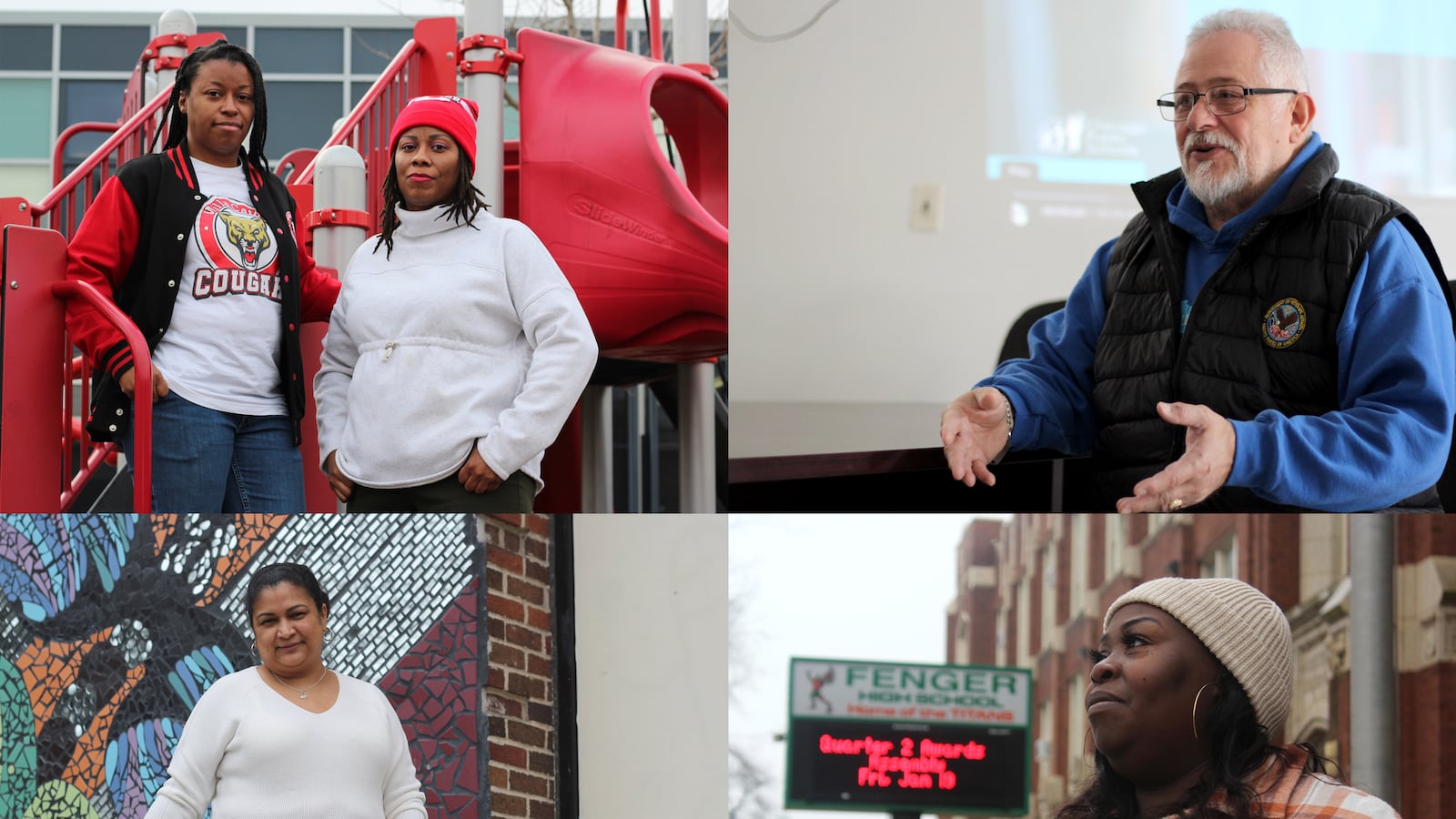Updated: This story has been updated to reflect an extension to the deadline for candidates to file paperwork to run for LSC. It is now Wednesday, Feb. 14.
Sign up for Chalkbeat Chicago’s free daily newsletter to keep up with the latest education news.
In the halls of Uplift Community High School, Karonda Locust is known as “Mama T.”
“If you need help, go tell my mom,” her daughter Tiara, now 23, would tell her friends when she was a student there.
“That’s how I got stuck here,” Locust said with a laugh on a recent Monday.
For four years while her daughter attended Uplift, Locust served as a parent representative on the school’s Local School Council, the governing body of community members, parents, and school staff that make decisions about the school’s budget and academic plan and evaluate the school’s leaders. Locust has also served on the LSC at Willa Cather Elementary school, where her youngest daughter still attends, for nine years.
For Locust, the LSC was a gateway to more involvement in the school.
“That’s how it should be,” said Locust’s sister Taschaunda Hall, who is also an active member of the Cather’s LSC and briefly served on the LSC at Uplift as well.
Chicago’s LSCs are unique and powerful. There’s nothing quite like them in other school districts across the U.S. The Chicago School Reform Act of 1988 established that every CPS-run school would have a Local School Council. Today LSCs are made up of six parents, two teachers, two community members, a student representative, and the school’s principal.
But while the first LSC elections in 1989 had over 17,000 candidates, those numbers have plummeted over the years. The last LSC elections in 2022 saw just over 6,000 applicants, but voter turnout was at its strongest in a decade, with students making up the majority of the 110,700 voters.
Still, LSC members have successfully advocated for change and improvements and many believe the councils are the key to better schools across the city.
Now, with Chicago’s Board of Education adding elected seats for the first time this year and transitioning to a fully elected board in 2026, LSCs may become a sort of proving ground for positions with a broader reach.
“I do predict many of our LSC members may put their hat in the ring,” said Kishasha Ford, director of the CPS LSC Relations office. “Our LSC members [are] very well-equipped to do this work because they have some experience being on a kind of a board, because if you think about it, LCSs are like mini school boards for their local school.”
Elections for these “mini school boards’' are happening again this spring. The deadline to run for LSC is 3 p.m. next Wednesday, Feb. 14 and election day for elementary schools is April 10 and April 11 for high schools, with new two-year terms of office beginning July 1, 2024.
As of Feb. 1, 1,902 people had filed to run for LSC, according to district officials. At the same time last election cycle in 2022, 852 people had applied.
Over the decades, LSCs have changed the names of schools named after enslavers, removed controversial leadership, won capital improvements, even helped open new schools. Others have sat mostly empty, served as little more than a rubber stamp, or been rendered ineffective by infighting and conflicting interests.
It depends on who’s running the ship, says Kendra Snow, the lead parent organizer for grassroots organization Raise Your Hand for Illinois Public Education.
Studies showing that parent involvement in schools can have a major impact on student outcomes are abundant, but for LSCs to be effective, Snow argues, parents have to do more than just show up, they have to be informed.
But the “showing up” part is still a major part of the battle.
After elections in 2022, over a thousand LSC positions were unfilled and according to CPS data, 311 schools still have vacancies on their councils. Still, according to CPS, 97% of LSCs had enough members to meet “quorum,” which requires that seven members be present for the LSC to vote and conduct business.
Chalkbeat caught up with four parents who have served on LSCs, where they called for improvements and guided their schools through challenges. Their experiences demonstrate what LSCs are capable of, some of the reasons parents may be opting out, and how the role of LSCs may shift as Chicago gets an elected school board.
The mom who wants to open LSCs to more people
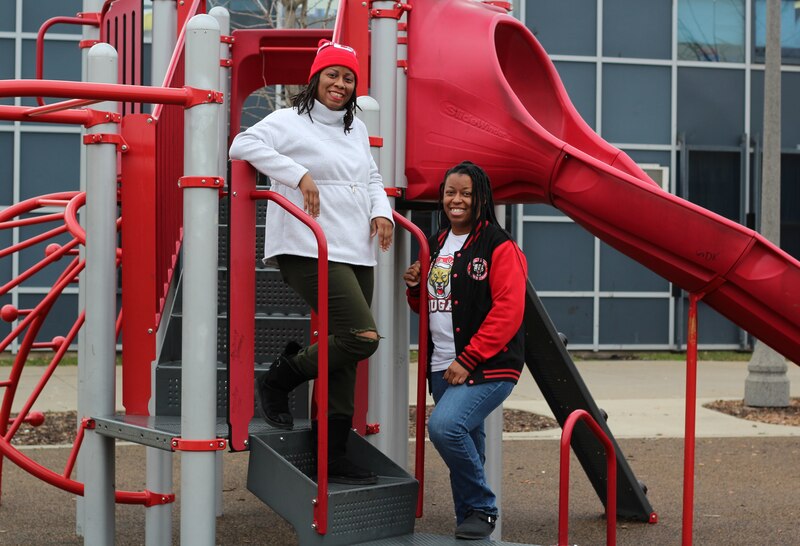
Karonda Locust is decked out in the red and black of Willa Cather Elementary school on a recent Monday morning. Today, she’s helping out at the security check-in at the front doors before heading to work, but “I’m always there, everywhere,” she says.
She chats easily with staff and students and no one questions her presence as she walks the halls. They all know who she is.
Locust has served on the LSC at Cather alongside her sister Taschaunda Hall for nine years. When her eldest daughter moved on to Uplift Community High School in 2019, she joined the LSC there as well. For four years, she served on both LSCs at the same time.
Her time on the LSC at Uplift helped her forge relationships with the staff and kids and she continues to volunteer there even though her daughter has graduated. That’s the point of LSCs, she said, to invest in not just your own kids, but the school community as a whole.
That’s why in 2022 when her daughter was a senior at Uplift, she and her daughter (who sat on the LSC as a student representative) advocated for a bus service to bring in more students from the West Side. Her own daughter would never benefit from it, but other kids would.
Now, a bus picks up kids from Cather Elementary to bring them to Uplift, giving West Side kids a chance to attend the school without leaving parents to figure out the hour-and-a-half commute.
“That’s one of the things that I’m most proud of – that we were able to bring kids from other neighborhoods to Uplift and they can have that experience as well,” said Locust.
With the first Chicago Board of Education elections happening later this year, Locust said several friends and community members have asked her to run for a seat, but she doesn’t have the time.
Instead, now that her daughter has graduated – she earned a scholarship to study education at Truman College and plans to become a teacher – Locust is shifting some of her focus to advocating for changes to the structures and rules of LSCs.
Some of the requirements for serving on LSCs, she says, are keeping people out.
When Locust herself was a teen mother, she had a hard time making it to her daughters’ school events. In her stead, she often sent grandparents or aunts or uncles, any way to make sure her kids felt supported. But none of those family members could run for the LSC as a parent representative – and none lived within the school’s neighborhood boundaries, making them ineligible to serve as a community representative.
Family structures have changed in the past three decades, said Locus, and she wants to open up LSCs to more family members outside of the traditional parent-child paradigm.
“We’re actually losing out on opportunities for family members that could support the school because of the structure that was created over 30 years ago,” said Locust. “This is a non-paid position, so if somebody wants to serve and help my kids’ school, God bless ‘em.”
She also hopes to end the fingerprinting and background check requirements for LSC parents, saying it alienates parents with criminal records and scares off parents who are undocumented, though, barring convictions for certain offenses, both are legally allowed to serve on LSCs.
The veteran LSC leader who built a new school
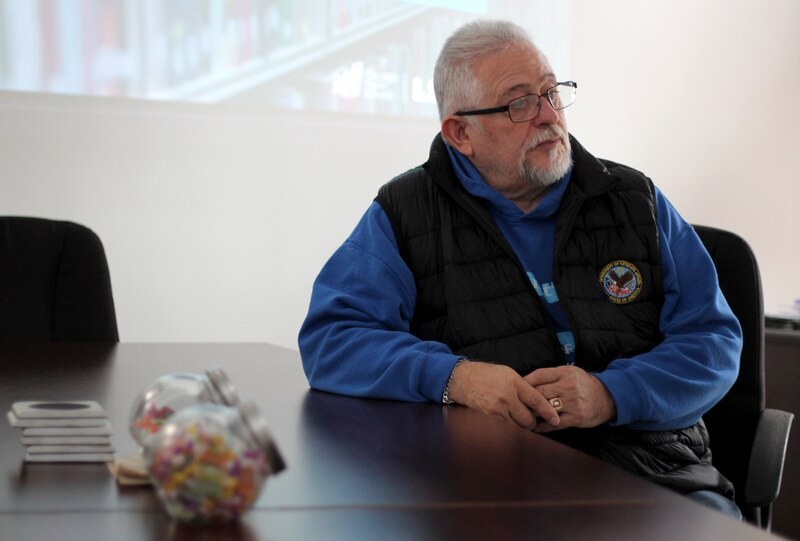
José Quiles has served on LSCs since they were first created in 1989. In his 35 years as a parent representative and then as a community representative, he’s seen it all.
The stories roll out of him with ease on a recent Thursday as he leads a Local School Council information session at the Belmont-Cragin not-for-profit organization he founded in 2015, the Education Community Committee (ECC).
He currently sits on LSCs at three schools – Mary Lyon Public School, Steinmetz College Prep, and Belmont-Cragin Elementary School – and when he’s not conducting LSC business, he’s teaching other people in the neighborhood how to join their LSCs and get things done on them.
In the workshops at ECC, they talk about things like how to read a budget and the rules and expectations for LSC members.
But what he hones in on and repeats over and over in the workshops is that the LSC is about the kids. All of the kids, not just their own.
That’s what sustained the eight-year movement he helped lead to get a new school built in Belmont-Cragin, he said – knowing that it was what the kids in the area needed.
“Belmont-Cragin started because Mary Lyon had 1800 kids,” said Quiles.
Initially, to address the overcrowding, some of the Mary Lyon kids were sent to a nearby site on Mango St. that was formerly the Catholic school St. James. When it became clear that the principal at Mary Lyon was struggling to oversee both school facilities, the LSC requested a separate principal and LSC to separate the school from Mary Lyon altogether, thereby creating a new school.
“Basically, we gave birth to it,” he said with a laugh.
Amid the swath of school closures in 2013, the St. James facility was closed and the students were relocated to a site on Palmer St., but the LSC found that there were not enough bathroom facilities for the students.
The LSC and other community organizations began pushing for a new school to be built at Riis Park.
In January 2023, the new Belmont-Cragin Elementary School officially opened in the park, offering 32 classrooms with park views, a black box theater, library, music room, and access to the connected park fieldhouse.
Quiles’ own children and foster children have long since graduated from the schools where he currently serves as community representative on the LSCs.
At 68, he says he wants to retire, but he’s worried that the LSCs aren’t ready for him to do so.
“A strong council moves mountains,” he told participants in Spanish during a recent LSC workshop. “But a weak council goes in no direction. And when you don’t move in any direction, there is no progress.”
That’s what his work with ECC is all about – educating parents so they know what questions to ask and how to push for change, whether on LSCs or as members of the new elected school board or as the voters who put people on those governing bodies.
Despite his insistence that he needs to retire, Quiles still has his ear to the floor at his local schools.
Right now, he says the biggest issues his LSCs are working on are the social emotional impacts of the pandemic on the students and supporting immigrant students and parents.
Advocating for the South Side
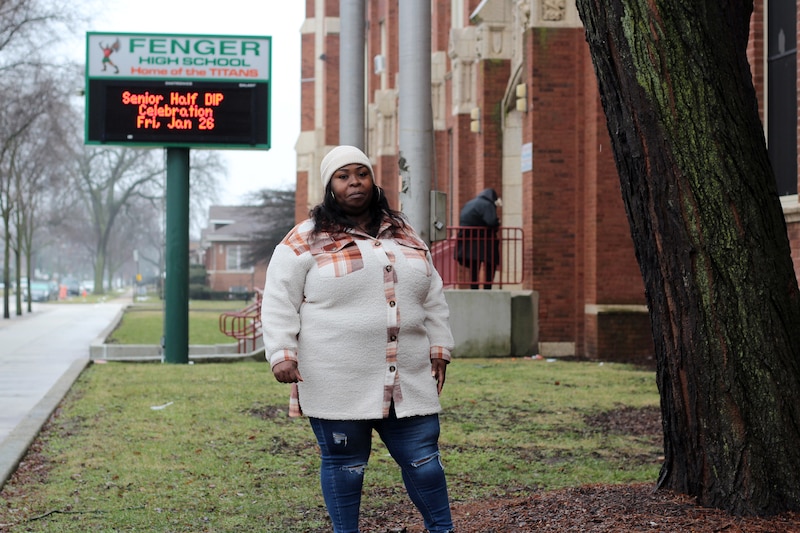
Back in 2002 when Kendra Snow sat on her first Local School Council at a school in Auburn-Gresham, “it was like a puppet show,” she said.
The principal “hand-picked” the parents she wanted on the council and ran the meetings, quickly going over budget lines. No one asked any questions or knew what anything meant.
“We were just bodies here to put a signature to something,” she said.
Then, Snow began to learn on her own.
“I had to learn this for myself, it’s the parents with the power, and if you want to know something then you read into it the same way she did,” said Snow. “So now I’m the troublemaker, because I challenged things.”
CPS supports LSCs with trainings and office hours, as well as 13 specialists supporting 511 LSCs, according to the department’s director Kishasha Ford.
There is a 300-page manual for LSC members and online modules as well as in-person trainings, said Ford.
“That’s the biggest part of our job is the education piece.” she said. “Because it is a lot to know and we can’t expect every single LSC member to know every single nuanced thing. That’s why we’re here to help support and to guide them.”
Snow read the manual and did the online modules, but she says, it’s not quite enough.
“You got to just do more than just watch these videos,” she said, suggesting that CPS incorporate questions into the modules to make sure viewers understood the material before moving on to the next video.
She supplemented her CPS training with resources and workshops from community organizations. Now, Snow works to empower other parents so they can have a voice on their LSCs. She is the lead parent organizer with Raise Your Hand for Illinois Public Education.
The mother of seven, Snow has been entrenched in public education since her eldest son, now 31, first attended school. In fact, it was when her son was accepted into a school on the North Side that Snow was able to compare his experience there to the schools her other children attended on the South Side.
The biggest difference?
“Resources,” she said. “We’re not fighting the same battles. The resources that are in those schools, we don’t have in our schools.”
In her experience, Snow said parents are angry about the lack of resources and come into the schools shouting about it. She sees it as her job to give them a more effective way to get things done.
“You’re not getting results that way. So now let’s fight a different way for what we need in the school,” she said. “You hit them with policies. You hit them with facts.”
Snow has concentrated her efforts specifically on the South Side where she grew up and where most of her children have attended public schools.
In her work as a CPS-certified LSC trainer, she hopes she can not only encourage more South Side parents to run for LSC seats, but help make sure they are informed and therefore empowered to help improve their schools – one parent at a time, one school at a time.
“Know your power. Know that this is for your kids,” Snow said. “You have to fight for your kids. Just be there. Just show up. It’s a couple hours out of the month. Just show up. That time is worth it for public education.”
Educating fellow parents, ousting a principal
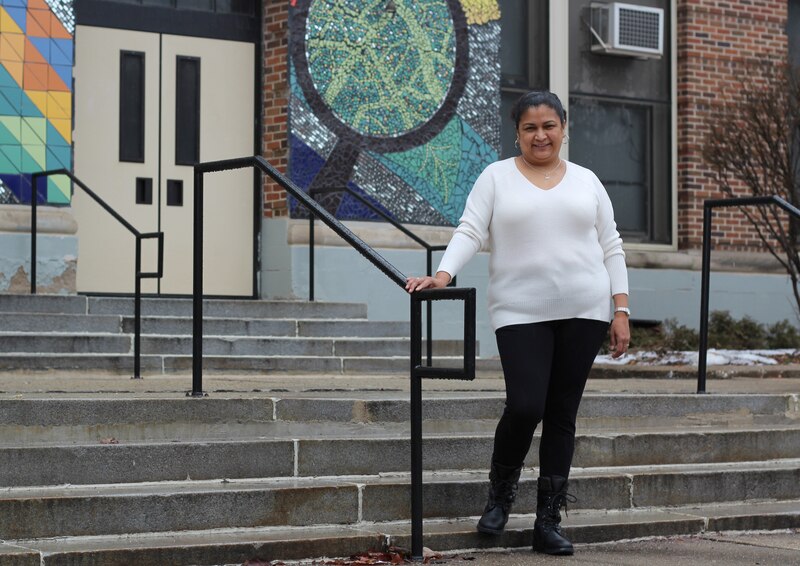
Vanessa Espinoza has been volunteering in Chicago Public Schools since before she had kids.
When she became a mother and began making friends with other parents, it opened her eyes to some of the inequities and challenges in CPS. Espinoza, who is bilingual, became particularly interested in supporting English language learners as well as students with IEPs, or Individualized Education Programs, to help students with special needs.
She soon joined the LSC at Orozco where her kids were enrolled and was surprised that few of the parent representatives understood the documents and policies they were supposed to be making decisions about.
“Why are you expecting the parents to approve something that they don’t understand totally?” she said. “You gave them the power just to say yes and no, but not do anything else.”
The trainings offered by CPS to parent representatives, she said, were superficial. For example, they teach the names of the budget lines, but not that each budget line can only be used for certain purchases.
“None of that was taught to the parents who were going to make this decision on the budget” she said.
However, Espinoza’s background as a support worker at another school gave her a leg up in this area. And her knowledge of finances turned out to be particularly important on Orozco’s LSC in 2014.
Because she knew how to read the budget, Espinoza soon discovered that the principal at the time was transferring large sums of money between budget lines, something that required approval from the LSC.
So she asked to see all of the reports on the budget and the school’s internal accounts. The principal refused and Espinoza requested an audit. The LSC tried to work with her, Espinoza said, but the principal was not amenable.
“This money’s for the kids. You don’t want to tell us where the money is and how you’re going to use it, then that’s it,” she said. " So we requested her removal.”
The council voted unanimously to remove Principal Nancy Paulette-Aguirre in November 2014.
But it wasn’t an entirely popular decision.
Most of the teachers at the school supported the decision, raising issues about turnover among other things and other LSC members said Paulette-Aguirre refused to work with the council, but non-LSC parents were split. On the day of the vote, 12 parents protested outside the school. Paulette-Aguirre was later removed from a second school in 2019.
“Even though the parents have the power to make significant changes, you have to be able to educate the parents with the information needed to make educated decisions, and [CPS] is not. In my opinion, they’re not.” said Espinoza.
She worries that these same issues might bleed over into the newly elected school board but is still hopeful that parents will gain some of the 10 elected seats this year.
“To have an elected school board that is going to be successful you have to have parents involved,” she said. “They know what their kids need.”
Espinoza’s children have graduated out of CPS, but Espinoza remains an advocate for education and serves as the bilingual communication specialist with Kids First Chicago and as the president and co-founder of Amigos de Gunsaulus, a parent-led non-profit that supports Gunsaulus Scholastic Academy in Brighton Park, where one of her children graduated.
Despite her challenging experience on Orozco’s LSC, she’s hopeful things can change as long as LSCs are filled with people who put the kids first.
“To be honest with you, it’s a lot of responsibilities, and it’s not well rewarded in a sense, not a monetary reward. Sometimes you get enemies,” but, she said, “If in your mind and your heart is the best for the kids’ education, I think you should run.”


